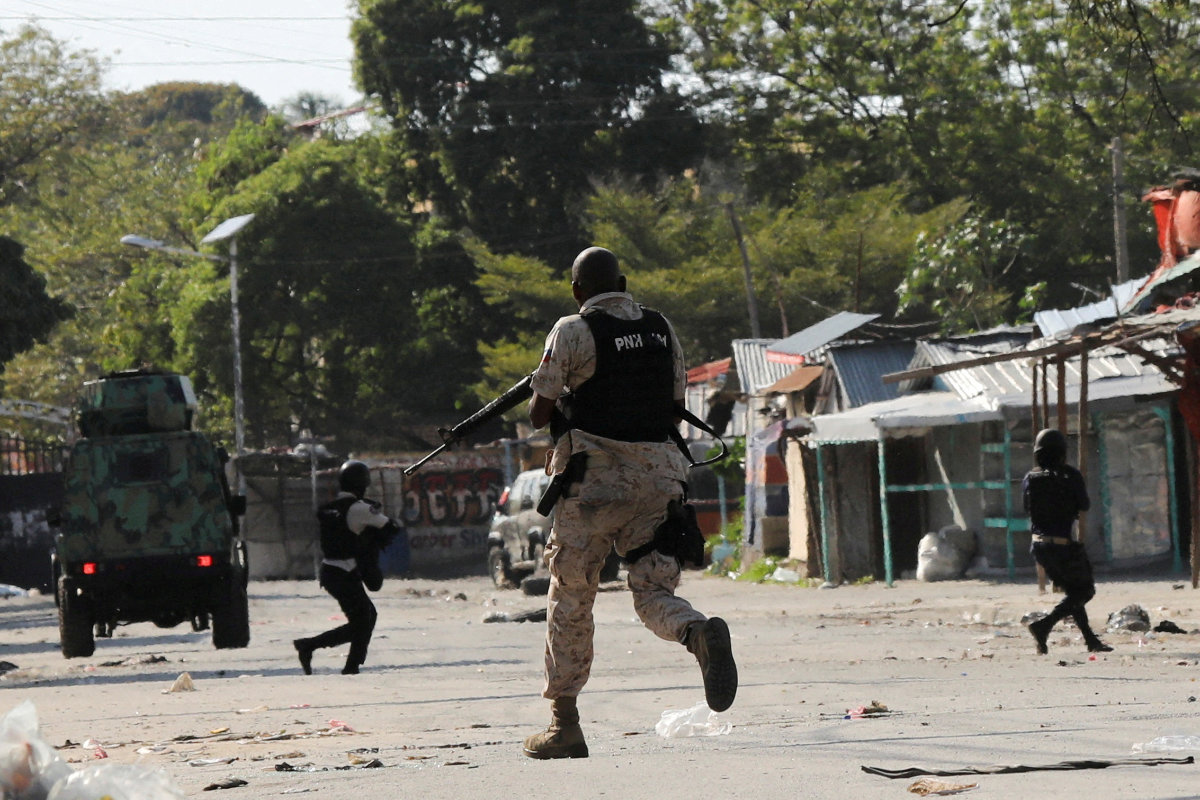PORT-AU-PRINCE, Haiti: Hundreds of inmates fled Haiti’s main prison after armed gangs stormed the facility in an overnight explosion of violence that engulfed much of the capital. At least five people were dead Sunday.
The jailbreak marked a new low in Haiti’s downward spiral of violence and came as gangs step up coordinated attacks in Port-au-Prince, while embattled Prime Minister Ariel Henry is abroad trying to salvage support for a United Nations-backed security force to stabilize the country.

Haiti's Prime Minister Ariel Henry gives a public lecture at the United States International University (USIU) in Nairobi, Kenya, on March. 1, 2024, amid gang violence in his troubled Caribbean country. (AP)
Three bodies with gunshot wounds lay at the prison entrance, which was wide open, with no guards in sight. Plastic sandals, clothing and electric fans were strewn across normally overcrowded concrete patios that were eerily empty on Sunday. In another neighborhood, the bloodied corpses of two men with their hands tied behind their backs laid face down as residents walked past roadblocks set up with burning tires.
Haiti’s government urged calm as it sought to find the killers, kidnappers and perpetrators of other violent crimes that it said escaped during the outbreak of violence.
“The National Police is taking all measures to find the escaped prisoners and arrest those responsible for these criminal acts as well as all their accomplices so that public order can be restored,” the Communications Ministry said in a post on X, formerly Twitter.
Arnel Remy, a human rights attorney whose nonprofit works inside the prison, said on X that fewer than 100 of the nearly 4,000 inmates remained behind bars. Those choosing to stay included 18 former Colombian soldiers accused of working as mercenaries in the July 2021 assassination of Haitian President Jovenel Moïse. On Saturday night, several of the Colombians shared a video pleading for their lives.
“Please, please help us,” one of the men, Francisco Uribe, said in the message widely shared on social media. “They are massacring people indiscriminately inside the cells.”
On Sunday, Uribe told journalists who walked breezily into the normally highly guarded facility “I didn’t flee because I’m innocent.”

Colombian inmates accused in the assassination of Haitian President Jovenel Moise talk to journalists inside the National Penitentiary in Port-au-Prince, Haiti, on March 3, 2024. (AP)
In the absence of official information, inmates’ family members rushed to the prison to check on loved ones.
“I don’t know whether my son is alive or not,” said Alexandre Jean as she roamed around the cells looking for any sign of him. “I don’t know what to do.”
The violence Saturday night appeared to be widespread, with several neighborhoods reporting gunfire.
There were reports of a jailbreak at a second Port-au-Prince prison containing around 1,400 inmates. Armed gangs also occupied and vandalized the nation’s top soccer stadium, taking one employee hostage for hours, the nation’s soccer federation said in a statement. Internet service for many residents was down as Haiti’s top mobile network said a fiber optic cable connection was slashed during the rampage.
In the space of less than two weeks, several state institutions have been attacked by the gangs, who are increasingly coordinating their actions and choosing once unthinkable targets like the Central Bank. After gangs opened fire at Haiti’s international airport last week, the US Embassy said it was temporarily halting all official travel to the country. As part of coordinated attacks by gangs, four police officers were killed Thursday.

Police officers battle gangsters trying to take control of Haiti on March 1, 2024. (REUTERS)
The epicenter of the latest violence Saturday night was Haiti’s National Penitentiary, which is holding several gang leaders. Amid the exchange of gunfire, police appealed for assistance.
“They need help,” a union representing police said in a message on social media bearing an “SOS” emoji repeated eight times. “Let’s mobilize the army and the police to prevent the bandits from breaking into the prison.”
The clashes follow violent protests that turned deadlier in recent days as the prime minister went to Kenya to try and salvage a proposed UN-backed security mission in Haiti to be led by the East African country. Henry took over as prime minister following Moise’s assassination and has repeatedly postponed plans to hold parliamentary and presidential elections, which haven’t happened in almost a decade.
Haiti’s National Police has roughly 9,000 officers to provide security for more than 11 million people, according to the UN. They are routinely overwhelmed and outgunned by gangs, which are estimated to control up to 80 percent of Port-au-Prince.
Jimmy Chérizier, a former elite police officer known as Barbecue who now runs a gang federation, has claimed responsibility for the surge in attacks. He said the goal was to capture Haiti’s police chief and government ministers and prevent Henry’s return.
The prime minister, a neurosurgeon, has shrugged off calls for his resignation and didn’t comment when asked if he felt it was safe to come home.


































